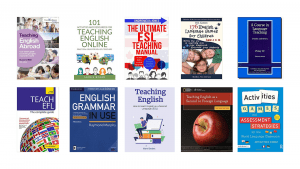Time to stop quoting sentence fragments from a book! Find out Teaching English without a book with these foolproof tips from a teaching legend.
The main idea of this research is how to teach English if you do not have a book to use and follow. Furthermore, this analysis demonstrates multipurpose fun-packed activities that come in handy in class when ditching a book. These activities are also carefully selected for different age groups and prove valuable for juniors and seniors.
Activities for juniors – teaching English without a book
Very young learners should be animated with the minimum usage of a book. Since they just stepped out of pre-school, learning for them ought to be playful and feel-good, effective and fruitful. Hence, the blend of education and entertainment is a must to build their study habits and also social skills for life.
Let us get started with the games such as ‘One potato, two potatoes and ‘Are you sleeping,’, ‘brother John/sister Jane’? They are handled identically by making a circle and counting or singing.
In the first game, the plural form must be stressed on the condition that the children are at a higher level of education. One student counts, the rest tightens their fists (‘potatoes’) and reiterates the words quietly. Finally, the winner is the one with one fist left, and they restart the game. This way, children learn a lot of words and verb+ing form.
7 Ready-to-Go Spolin Improv Activities for Your Classroom
The second game requires one child kneeling and ‘sleeping’ in the middle while the others move in a circle and sing. A boy (brother John) or a girl (sister Jane) are supposed to guess which of the other children says ‘Wake up,’’, then if they guess those two switch places. Simply, this is a typical ‘guess who’s game to prompt a child to recognize another child’s voice, to count from 1 to 7, and collect the phrasal verb ‘wake up’ and more.
Grammatically speaking, this is how the young students can spontaneously come to the knowledge of building the regular plural form of a noun by adding the suffix ‘s’, i.e. ’z’ as pronounced and Present Continuous Tense in an amusing and casual manner.
Bingo
is the most engaging activity for juniors who can read. Each student mouths a random word and boards it, so when it is done, they are given notes to write down only one word from the board and fold them. Then they draw a table with six boxes in their notebooks and fill the boxes with six words.
After that, one by one comes out, picks one note, and reads the word. Eventually, the one who wins is a student with all six words crossed out on their table. Besides all fun, this is a great opportunity for juniors to exercise reading and writing at this stage.
Total Physical Response and Situational Language Teaching
Bingo can help you teach English without a book. To avoid a dictation, a good way of practising writing is the competition between two students who come out to write a word shouted out by the third student is a good way of practising writing.
A student who boards the word correctly and does it faster than the other one wins around. As it creates an uplifting atmosphere, the game can be played in multiple rounds, and this kind of dictation will no longer be a nightmare for little learners.
Activities for seniors – teaching English without a book
Senior students are to enhance their academic and social skills throughout diverse games, and highly recommended ones are mingling activities. There are copious games with tiny pieces of paper, i.e., notes, to boost students’ speaking skills, reading comprehension, and communication among students. Here are two activities to explain: First, students reflect on the sentence
“I cannot live without ______ in the mornings’, then write down only one thing on the notes and halve them. A teacher gathers all the notes and lets students pick one and keep it for themselves. Afterwards, students unfold their notes and mingle to find whose notes note they get. In the end, when the assignment is completed, students spring into a discussion on why they opted for the particular thing. Thus, they practise their speaking, presentation, and communication skills.
Experiential/Hands-on Learning in TEFL
Another activity is alike similar but more complex as it covers more language skills to upgrade.
Each student gets a brief description of an amazing place in the world to read and remember. After that, students approach the table laden with pictures of the places, find the one that matches their description and ponder how to seduce convince another person into taking an adventure to that very place.
To do that, students mix and chat so as to coax one another to join in the exploration of the given places. At last, they come back to their seats and discuss if they manage to accomplish the mission. this is a terrific mode to develop a variety of skills ranging from reading, matching, speaking to memorizing, which makes this activity a genuine brain training.
In addition, it is preferable to test seniors in General knowledge at different levels by asking them the questions that can be found on the Internet:
- Where is Mount Everest?
- Who invented the aeroplane?
- Is it possible to go by ship to Paraguay?
Concerning a grammar focus such as, e.g., the Second Conditionals, students may be asked to write an essay on “: If I were a millionaire, I would…” to improve their writing skills and learn to utilize the Conditionals correctly. Logically, similar activities can also be applied to other grammar sections.
All in all, there are so many jam-packed activities to help students engage and learn in the most creative fashion, so teachers should take the tour alongside their students and jointly ideate their lessons to make them memorable and enjoyable in every sense.
How to Choose ELT Coursebooks or Materials
REFERENCES:
- Meddings, L., & Thornbury, S. (2009). Teaching unplugged. Delta publishing.
- Ur, P., & Wright, A. (1992). Five-minute activities: A resource book of short activities. Cambridge University Press.
Hopefully, you have an idea about Teaching English Without a book. If feel like this article really helpfully you can share this.







